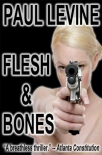Lassiter 07 - Flesh and Bones Levine, Paul (best ereader for academics txt) 📖

Book online «Lassiter 07 - Flesh and Bones Levine, Paul (best ereader for academics txt) 📖». Author Levine, Paul
I put down the manual and did a little sidestep toward the defense table, forcing the judge's gaze toward the lovely defendant. She looked as helpless and innocent as an angel without wings. "If Christina Bernhardt was suffering from flashbacks or blackouts which coincided with the shooting, she made no conscious decision to shoot the gun and could not be guilty of murder one. If she's been overcharged, bond should be granted."
"Blackouts," the judge mused. "Flashbacks. Is that your case, Jake?"
Using my given name. A little familiarity, asking me to cut the bullshit and level with the court. What's the trial going to be all about? I had already summarized Dr. Schein's opinion, right down to Sigmund Freud's view of repression as a defense mechanism used to suppress psychic trauma.
"That is the proffer of Dr. Schein's testimony," I said, and out of the corner of my eye, I saw Socolow shoot me a look. He doesn't miss much, and he didn't miss this. I hadn't answered the question.
Just before the bailiff called our case, I had huddled with Chrissy in the jury room, our courthouse being woefully insufficient in meeting space. "I look terrible," she said, fiddling with her hair, which was held back in a ponytail with a simple rubber band.
"You look beautiful," I told her, violating another of my rules, the one about maintaining a professional distance from the clients. I don't go fishing with the guy customers and I don't go to bed with the gals.
"Am I going to testify?" she asked.
"Not today. But before we go in there, I need to tell you something. Dr. Schein is prepared to testify that you may have suffered a blackout before the shooting, that you were in a trancelike state when you shot your father."
She looked at me with those bright green eyes. "You're asking me a question, aren't you? Like, is that the way it happened?"
I held my breath and nodded.
"Do you want the truth?" she asked.
"Yes," I said.
No, I thought. I can't handle the truth.
"I didn't black out. I wasn't in a trance. I saw Daddy sitting there, so pleased with himself. I wanted to hurt him. I wanted to hear his screams. I wanted him to hurt as much as he had hurt me. But did I want to kill him? I don't know. I really don't."
"Doesn't matter. If you understood that your actions created a strong likelihood of death, you're guilty of premeditated murder."
Her eyes opened wider, seemed to ask a pleading question: What are we going to do? I didn't know. I came into the courtroom drowning in my dilemma, the ethical conflict of a lawyer who owes the highest duty of loyalty to his client and a somewhat more vague duty to the legal system.
Now, I was doing a high-wire act, portraying our defense in terms of "if." If there had been a blackout, blah, blah, blah. At trial, it becomes more difficult. I wouldn't be able to put Dr. Schein on the stand to testify to something Chrissy couldn't corroborate. And now that she told me she had known very well what she was doing, I couldn't let her take the stand to say she had blacked out, even if she wanted to. I've never lied to the court or let a client do it. I like to win, but I like to win fair and square. I know it's old-fashioned, but that's the way I am. I like the low-scoring, smash-mouth, frozen-field Big Ten game, not the lah-de-dah, point-a-minute passing of touch football in the SEC. I hate guys who jitterbug in the end zone after scoring a touchdown. Celebration of self, dirty dancing, and taunting opponents have no place in the game I love.
When I was at Penn State, Joe Paterno ordered us to hand the ball to the official should we ever be so fortunate as to cross the goal line while carrying the leather spheroid. "Act as if you've been there before," he said. I hadn't, but in a game against Pitt, I blocked a punt in the end zone, not with my hands, but with my head. The ball stuck in my face mask and gave me a concussion. I thought I should have had a touchdown, but the officials ruled it a safety because I never had possession of the ball . . . my helmet did. It took two equipment managers to get the ball out of the mask, and I saw double for a week. But I had scored. Two points for my career.
"So, to paraphrase your argument," Judge Stanger said, spitting out a few fibers of Cuban tobacco, "you're seeking bond as if this were a second-degree or manslaughter case."
"That's what they should have charged," I responded, "but let there be no mistake, Your Honor. Our plea is not guilty. We'll be seeking an instruction under 782.03 on excusable homicide."
"That's outrageous!" Socolow thundered. "This wasn't an accident. That's the most absurd argument I've ever heard in a courtroom."
"You've lived a sheltered life," I whispered to Abe, then turned back toward the judge. "Accident is not the only statutory excuse for homicide, Your Honor." Again, I picked up the book. Even when I've memorized the statute, it





Comments (0)